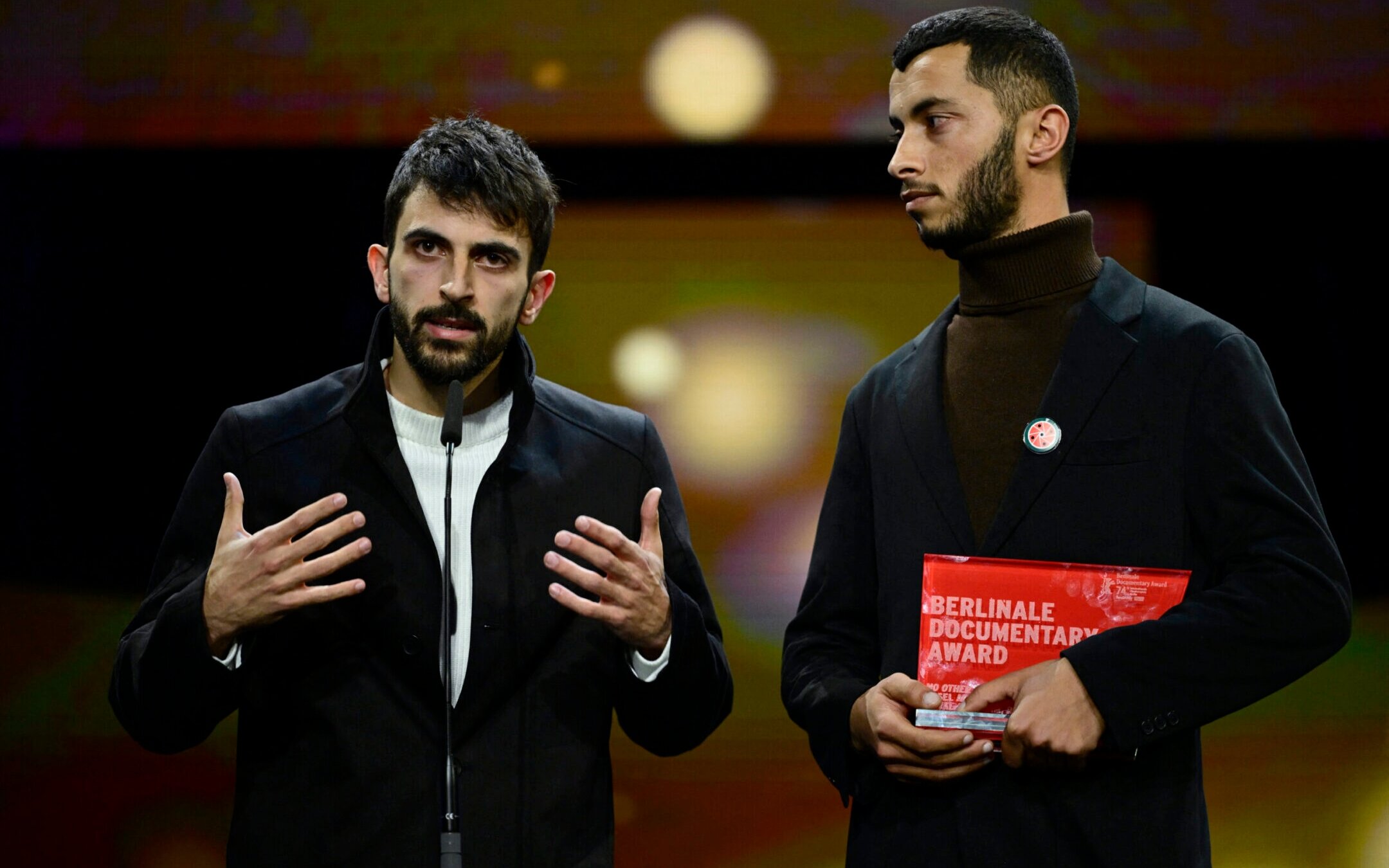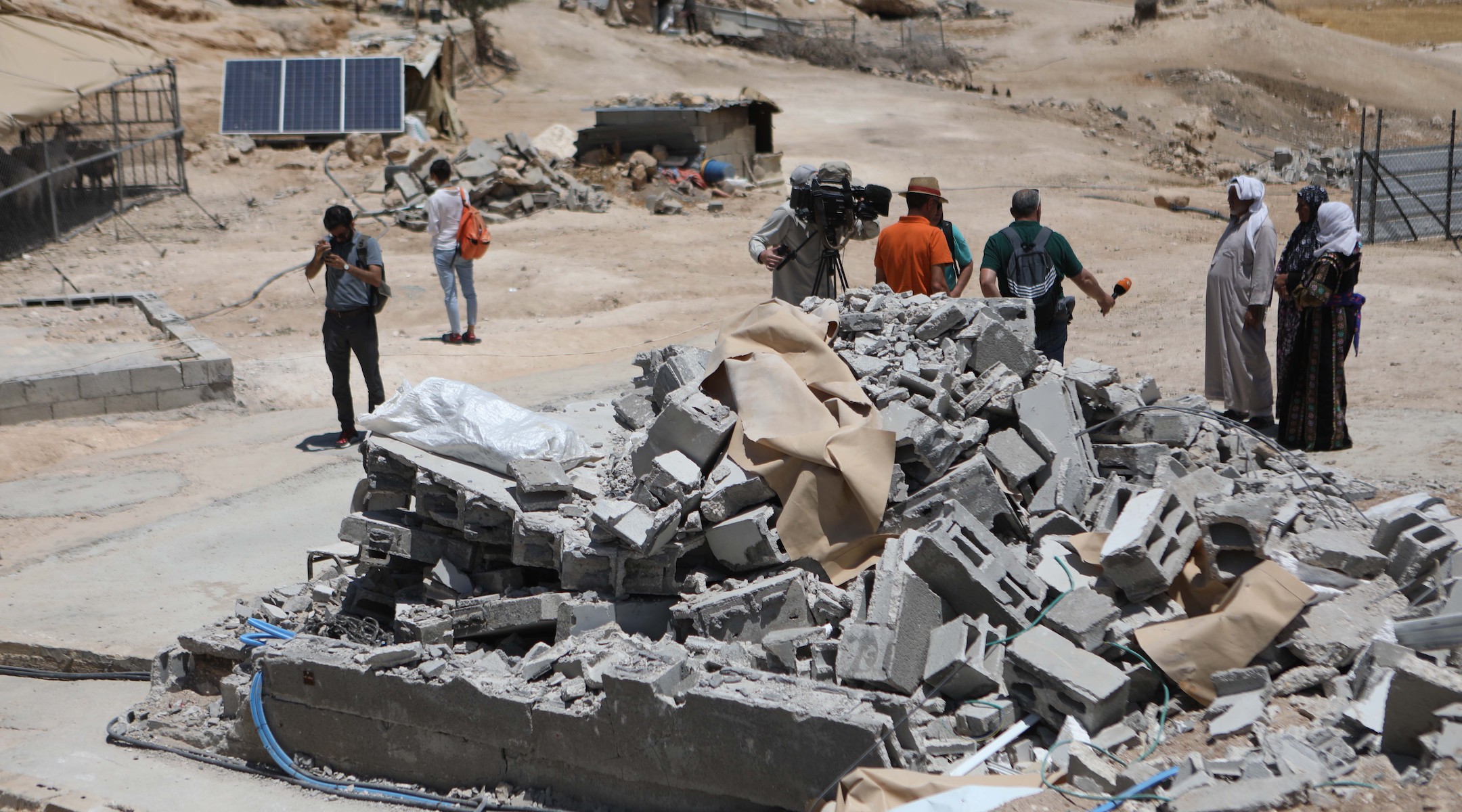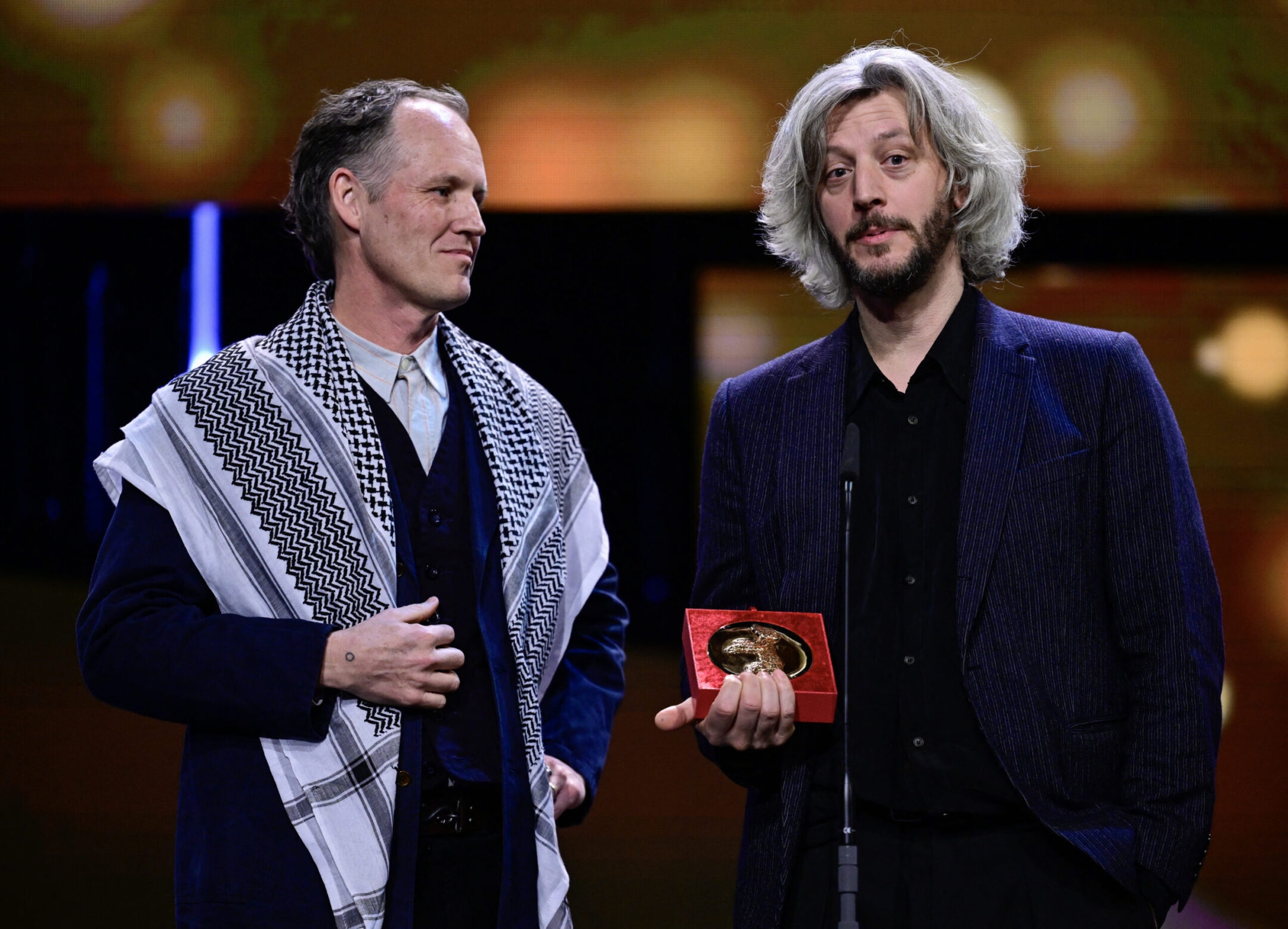Israeli journalist criticizes West Bank ‘apartheid’ at Berlin film festival ceremony marked by Gaza war protests
The Berlinale’s closing ceremony included multiple calls for a Gaza ceasefire, in a display that Berlin’s mayor condemned as antisemitic

Israeli director Yuval Abraham (L) and Palestinian director Basel Adra speak on stage after having received the Berlinale documentary award for “No Other Land” during the awards ceremony of the 74th Berlinale International Film Festival, Feb. 24, 2024 in Berlin. (John MacDougall/AFP via Getty Images) Photo by Getty Images
BERLIN (JTA) — An Israeli journalist says he has been receiving death threats after winning two major prizes at the Berlinale International Film Festival for his documentary about Israel’s expulsion of Palestinians from their West Bank villages.
The prizes were awarded during the film festival’s closing ceremony, during which multiple filmmakers — including a Jewish American — spoke out against Israel’s war in Gaza. Some called Israel’s actions a “genocide,” a common charge among pro-Palestinian activists that Israel vigorously denies and that Berlin’s mayor condemned.
The Israeli journalist, Yuval Abraham, spoke out about Israel’s occupation of the West Bank. Abraham was part of the team behind “No Other Land,” about Masafer Yatta, a collection of villages whose land Israel has sought to use as a military zone. In 2022, after a two-decade legal battle, the Israeli Supreme Court ruled that Israel had the right to the land and that the roughly 2,000 Palestinians living there could be forced to leave.
The documentary, a Palestinian-Norwegian coproduction, focuses on the Palestinian activist Basel Adra, who, together with Abraham, has documented Israel’s demolition of houses in his region. The film does not focus on the conflict’s broader context, concentrating on the view from inside the village.

Members of Palestinian Masafer Yatta communities in the West Bank regard the remains of their West Bank homes, May 7, 2022. (Mamoun Wazwaz/Anadolu Agency via Getty Images)
On Sunday, “No Other Land” won the Berlinale’s best documentary award and the Panorama Audience Award, determined by the votes from 24,000 audience members.
In his acceptance speech, Abraham, a freelance reporter who frequently writes for left-wing publications in Israel and beyond, offered a harsh critique of Israel’s West Bank occupation.
“We are standing in front of you now, me and Basel are the same age. I am Israeli; Basel is Palestinian. And in two days we will go back to a land where we are not equal,” Abraham said.
“I am living under a civilian law and Basel is under military law. We live 30 minutes from one another, but I have voting rights. Basel is not having voting rights. I’m free to move where I want in this land. Basel is, like millions of Palestinians, locked in the occupied West Bank,” he continued. “This situation of apartheid between us, this inequality, it has to end.”
Adra, meanwhile, denounced what he said was Israel’s “massacre” of Palestinians and Germany’s arms sales to Israel.
The Israeli news network Kann, Israel’s public broadcaster, aired a segment about Abraham’s comments in which the network characterized his comments as “antisemitic.” In the segment, the Israeli film critic Ron Fogel said he was uncomfortable because of the criticism dealt to Israel at the film festival.
“Israel’s channel 11 aired this 30 second segment from my speech, insanely called it ‘antisemitic’ — and I’ve been receiving death threats since,” Abraham tweeted late Sunday. “I stand behind every word.”
The award came as Israel has drawn international criticism over its war in Gaza and as Israeli lawmakers approve the construction of thousands of new West Bank settlement homes for the first time in years, despite U.S. opposition.
A “No Other Land” screening at the Berlinale drew protesters who shouted “From the river to the sea, Palestine must be free,” a statement criminalized in Germany because it is understood by many as calling for Israel’s destruction.
When another audience member praised the film, made by a team of Israelis and Palestinians, as an effort to “stop this cycle of horrible violence, which includes a horrible massacre of thousands of Jews by Hamas,” he was shouted down.
There were several other anti-Israel protests at the festival. Reportedly, some audience members held up “Free Gaza” signs at the opening gala; and on Feb. 18, a few dozen protesters unfurled a banner at the European Film Market that read, “Lights, Camera, Genocide.” At the closing event, several artists used their speaking slots to denounce the war and call for a ceasefire, including the American filmmaker Eliza Hittman, who won a prestigious prize at the festival in 2020.
“As a Jewish filmmaker who won the Silver Bear in 2020, it is important for me to be here,” she said, adding, “There is no just war, and the more people try to convince themselves there’s a just war, the more they commit a grotesque act of self-deception.”
The American filmmaker Ben Russell wore a keffiyeh, or Arab scarf often used to signify support for Palestinian, to the ceremony, where he won a prize for a film about French environmental activists that he co-directed.

Filmmakers Ben Russell (L) and France’s Guillaume Cailleau stand on stage while receiving the Encounters Award for Best Film for their film “Direct Action” during the awards ceremony of the 74th Berlinale International Film Festival, Feb. 24, 2024 in Berlin. (John MacDougall/AFP via Getty Images)
Berlinale organizers rejected calls from some curators and artists to issue an official ceasefire call. But during the festival’s closing, its social media account briefly displayed antiwar messages. Festival officials said the account had been hacked and that they planned to file criminal charges in response to the incident.
“From our unresolved Nazi past to our genocidal present — we have always been on the wrong side of history,” said one message, which was quickly deleted but preserved in screenshots that circulated online. “But it’s not too late to change our future.”
Berlin’s mayor, Kai Wegner, called the comments at the closing ceremony an “intolerable relativization.” He tweeted, “Antisemitism has no place in Berlin, and that also applies to the art scene.”
The film festival was also home to an effort to promote constructive conversation about the Israel-Hamas war, through a “Tiny House” initiative operated by an Israeli and a Palestinian living in Germany that aims to create a safe space for dialogue.
This article originally appeared on JTA.org.















